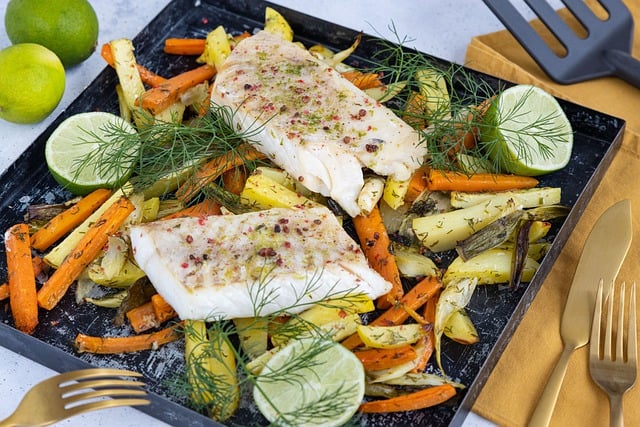The New Year has arrived, and with it comes a renewed commitment to improving our lives through behavio r changes. This is the brief time of the year when we admit that we can not keep doing the same things and expect different results. The desire for better health requires us to show up in another way with distinct choices and different behaviors. One way to do this is to improve our diet. But what exactly is good food? And what food choices will make us healthier? This article explores these questions and provides answers that can help us improve our health.
r changes. This is the brief time of the year when we admit that we can not keep doing the same things and expect different results. The desire for better health requires us to show up in another way with distinct choices and different behaviors. One way to do this is to improve our diet. But what exactly is good food? And what food choices will make us healthier? This article explores these questions and provides answers that can help us improve our health.
Fortunately this last year has produced the results of s everal large studies that address this concern very directly. There are always lots of studies that focus on what damage one particular food component will create or what miraculous results can be hoped for with some new exotic herb or elixir. The last few years have also looked at the diets of various cultures and measured the health outcomes of all these many different diet styles. But this last year has had researchers combining the results of lots of these various different studies and trying to figure out what the common features are that improve health and extend life between all the previous studies.
everal large studies that address this concern very directly. There are always lots of studies that focus on what damage one particular food component will create or what miraculous results can be hoped for with some new exotic herb or elixir. The last few years have also looked at the diets of various cultures and measured the health outcomes of all these many different diet styles. But this last year has had researchers combining the results of lots of these various different studies and trying to figure out what the common features are that improve health and extend life between all the previous studies.
The consensus is that: natural traditional foods prepa red simply promote health and longevity. Alternative health teachers have been saying that for the last 70 years. The more processing a food undergoes, the less healthy it is. A recent study highlighted the damaging effects of processed plant-based foods. Fake meats and simulated dairy products are examples of foods that have been processed to the point that they look like something they are not, and they are toxic.
red simply promote health and longevity. Alternative health teachers have been saying that for the last 70 years. The more processing a food undergoes, the less healthy it is. A recent study highlighted the damaging effects of processed plant-based foods. Fake meats and simulated dairy products are examples of foods that have been processed to the point that they look like something they are not, and they are toxic.
Our immune systems have been learning how to de al with natural foods for millions of years. But suddenly we have thousands of new chemicals in our food from processing, and our immune systems don’t know how to handle them. It might take thousands of years for our bodies to adapt, but evolution takes time. When a big environmental change happens, most of the species die off, and the few that have genetic mutations that help them adapt survive and reproduce. Those of us who don’t respond well to the changes in our food environment are the ones who are dying off. Those who have lucky genes that help them adapt will be the future.
al with natural foods for millions of years. But suddenly we have thousands of new chemicals in our food from processing, and our immune systems don’t know how to handle them. It might take thousands of years for our bodies to adapt, but evolution takes time. When a big environmental change happens, most of the species die off, and the few that have genetic mutations that help them adapt survive and reproduce. Those of us who don’t respond well to the changes in our food environment are the ones who are dying off. Those who have lucky genes that help them adapt will be the future.
I am not saying this to be a downer, but if we want t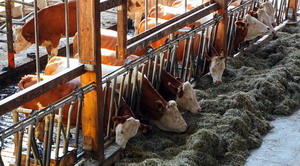 o be healthy, we need to stick to foods that our bodies know how to work with. That means traditional foods that existed a thousand years ago, not stuff invented last week. Even this admonition can be tricky these days. Traditionally raised animal and vegetable foods are very different from what we buy most of the time at a grocery store. Most of you understand that breakfast cereal, candy, packaged dinners, protein bars, and so on are heavily processed foods full of foreign chemicals. But do you ever stop to think that how we raise animals for meat these days is totally foreign and changes the chemistry of those meats? Grazing animals like cows are meant to eat grass, not grain. Grain is for birds and rodents. Are you aware that most of the vegetables you buy at the store never existed 100 years ago? Fruits have been hybridized to be totally different nutritionally than what they were naturally. Most of our raw ingredient food supply has been processed a dozen ways and with thousands of chemicals before it ever makes it to a grocery store, much less a factory that then turns it into some new super convenient food.
o be healthy, we need to stick to foods that our bodies know how to work with. That means traditional foods that existed a thousand years ago, not stuff invented last week. Even this admonition can be tricky these days. Traditionally raised animal and vegetable foods are very different from what we buy most of the time at a grocery store. Most of you understand that breakfast cereal, candy, packaged dinners, protein bars, and so on are heavily processed foods full of foreign chemicals. But do you ever stop to think that how we raise animals for meat these days is totally foreign and changes the chemistry of those meats? Grazing animals like cows are meant to eat grass, not grain. Grain is for birds and rodents. Are you aware that most of the vegetables you buy at the store never existed 100 years ago? Fruits have been hybridized to be totally different nutritionally than what they were naturally. Most of our raw ingredient food supply has been processed a dozen ways and with thousands of chemicals before it ever makes it to a grocery store, much less a factory that then turns it into some new super convenient food.
What are we to do? Most of us cannot avoid some le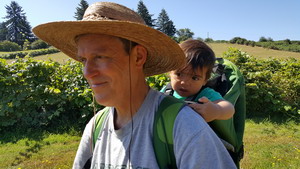 vel of processing of our food. My brother lives on a 27-acre farm where he grows all his food. He has cows and sheep and chickens and a big pond full of fish. He has a massive garden and tons of different fruit trees, nut trees, and berry bushes. He lives on fresh organic food. And he has lots of freezers to store this food in until he and his family are ready to eat it. Most of us don’t have that. So we have to accept that we are starting at a disadvantage in our efforts to eat a healthy diet. We do what we can do. What does that look like?
vel of processing of our food. My brother lives on a 27-acre farm where he grows all his food. He has cows and sheep and chickens and a big pond full of fish. He has a massive garden and tons of different fruit trees, nut trees, and berry bushes. He lives on fresh organic food. And he has lots of freezers to store this food in until he and his family are ready to eat it. Most of us don’t have that. So we have to accept that we are starting at a disadvantage in our efforts to eat a healthy diet. We do what we can do. What does that look like?
Your best food choices are foods that you find in the store that only have one ingredient. As soon as you start addin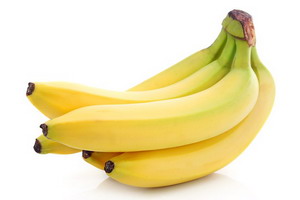 g ingredients, you have started processing that food. For example, an organic banana only has banana in it, hopefully. Choose organic foods whenever possible to avoid all the pesticides, fungicides, herbicides, preservatives, and whatnot. Choose foods that are raw and in their natural form. An example here is nuts. Most nuts are roasted and sprayed with oil and salt. Go for the raw nuts. Even better is when the nuts are still in their shells. Already you can see here that eating a diet of truly good foods is not convenient at all. It takes effort to soak your pinto beans overnight, then wash them a couple of times, then slow-cook them for hours before eating them. We have chosen processed foods for a reason: effort. Healthy food requires effort.
g ingredients, you have started processing that food. For example, an organic banana only has banana in it, hopefully. Choose organic foods whenever possible to avoid all the pesticides, fungicides, herbicides, preservatives, and whatnot. Choose foods that are raw and in their natural form. An example here is nuts. Most nuts are roasted and sprayed with oil and salt. Go for the raw nuts. Even better is when the nuts are still in their shells. Already you can see here that eating a diet of truly good foods is not convenient at all. It takes effort to soak your pinto beans overnight, then wash them a couple of times, then slow-cook them for hours before eating them. We have chosen processed foods for a reason: effort. Healthy food requires effort.
Here is another health tip: How you prepare food at  home is a form of processing. Avoid cooking methods that make food toxic. The biggest concern is cooking with high heat, which forces chemical reactions that produce toxic byproducts. Grilling creates cancer-causing acrylamide in meats. Heat turns healthy oils into toxic rancid oxidized oils, so frying or deep-frying with liquid oil is a bad choice. Heat does little damage to saturated fats. The least damaging cooking methods are steaming, boiling, low-temperature baking, and sous vide cooking. Slow cooking in a crock pot is also pretty good.
home is a form of processing. Avoid cooking methods that make food toxic. The biggest concern is cooking with high heat, which forces chemical reactions that produce toxic byproducts. Grilling creates cancer-causing acrylamide in meats. Heat turns healthy oils into toxic rancid oxidized oils, so frying or deep-frying with liquid oil is a bad choice. Heat does little damage to saturated fats. The least damaging cooking methods are steaming, boiling, low-temperature baking, and sous vide cooking. Slow cooking in a crock pot is also pretty good.
 at each ingredient is and does? If not, then don’t buy it. The most obvious ingredient to avoid is sugar in all its many forms and names. If some form of sugar is in the first five ingredients, then put that sucker back on the shelf. Personally, I avoid all preservatives and coloring agents. There is a boatload of other weird chemicals they put in foods. I figure that if nature doesn’t make it, then my body is not going to know what to do with it. If you have any food allergies or sensitivities, you are probably already very conscious of reading food labels.
at each ingredient is and does? If not, then don’t buy it. The most obvious ingredient to avoid is sugar in all its many forms and names. If some form of sugar is in the first five ingredients, then put that sucker back on the shelf. Personally, I avoid all preservatives and coloring agents. There is a boatload of other weird chemicals they put in foods. I figure that if nature doesn’t make it, then my body is not going to know what to do with it. If you have any food allergies or sensitivities, you are probably already very conscious of reading food labels.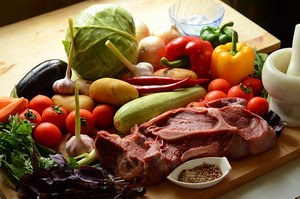 and they are now developing the same bad health problems that we experience in the US today. One of the things that recent studies have looked at very closely is the consumption of meat versus vegetables. The conclusion was that this is a non-issue. How they prepared the food and the quality of the food was much more of a factor. Vegetarians tend towards more autoimmune diseases, while meat eaters tend towards more cardiovascular issues, but both groups lived about as long in these “healthy” eating cultures. For instance, the Okinawans are known for their long lifespans, and Okinawa is known in Japan as the island of pigs because everyone there eats some form of pork at every meal. Studies there show that the secret to longevity lies more in living within a strong community where everyone supports one another. To me, this says that less stress helps you live longer.
and they are now developing the same bad health problems that we experience in the US today. One of the things that recent studies have looked at very closely is the consumption of meat versus vegetables. The conclusion was that this is a non-issue. How they prepared the food and the quality of the food was much more of a factor. Vegetarians tend towards more autoimmune diseases, while meat eaters tend towards more cardiovascular issues, but both groups lived about as long in these “healthy” eating cultures. For instance, the Okinawans are known for their long lifespans, and Okinawa is known in Japan as the island of pigs because everyone there eats some form of pork at every meal. Studies there show that the secret to longevity lies more in living within a strong community where everyone supports one another. To me, this says that less stress helps you live longer.Ellen
We are preparing for a week of family participation. My family members are gathering from all over to celebrate my mother’s 95th birthday. We will be housing my son Devon several days as well as my brother and sister in law one day. So Ellen and I have been busy cleaning up the house to get ready for company.
mother’s 95th birthday. We will be housing my son Devon several days as well as my brother and sister in law one day. So Ellen and I have been busy cleaning up the house to get ready for company.
Plant based meat substitutes are highly processed foods and not surprisingly they raise inflammation. This affects the brain and in this study was shown to increase depression 42%.
___________________________
“It is not my job to know the answers. My job is to ask the right questions.“
~ David DeLapp
_____________________________________
The folks at Caltech have translated human inform ation processing into computer terms and concluded that on average we process at a measly 10 bits per second. And yet our sensory system sends about 100 million bits of information to the brain every second. That means we understand our world and make decisions based on processing only one out of every 10 million bits of information presented to us on our brain level. We must be clueless!
ation processing into computer terms and concluded that on average we process at a measly 10 bits per second. And yet our sensory system sends about 100 million bits of information to the brain every second. That means we understand our world and make decisions based on processing only one out of every 10 million bits of information presented to us on our brain level. We must be clueless!
____________________________
“Nothing risked, nothing gained. If you do not “show up” in life by risking and being vulnerable, you do not get to play… “
~ David DeLapp
________________________________________
Coffee reduces risk of head & neck cancers
While it is well known that tobacco and alcohol stimul ate cancers of the head and throat, this new study is showing that drinking 4 cups of coffee per day reduces the occurrence of these cancers varying amounts depending upon which cancer was studied.
ate cancers of the head and throat, this new study is showing that drinking 4 cups of coffee per day reduces the occurrence of these cancers varying amounts depending upon which cancer was studied.
________________________
“Everything you experience is your own perception and creation. Victim, aggressor, mediator, etc are all just roles we choose to get what we want. “
~ David DeLapp
